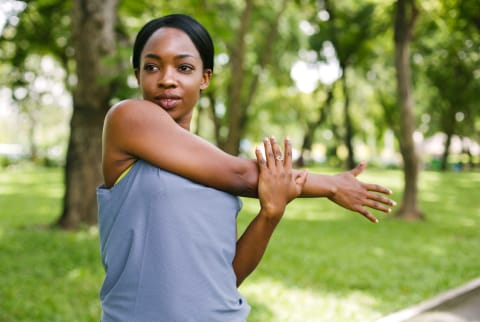Advertisement
How Gym Class Still Affects The Way You Exercise Today


Sometimes it can feel like there are just some people who naturally love working out and feel extremely motivated to build that morning run into their schedules—and then there are the folks who just don't. For some, knowing they need to exercise regularly and committing to doing it is definitely not to be confused with actually enjoying the physical exertion.
Now scientists have a surprising clue as to what might be causing these two very different mindsets: It might all start in gym class.
Researchers at Iowa State University polled 1,028 adults about both their exercise habits now and what they remember about physical education from back when they were kids—and they found a close relationship. People who hated P.E. as young students were more likely to not like working out today and less likely to want to do it. Those who did enjoy running around the school auditorium back then tended to like exercise way more today and be more driven to be fit. That's an enormously life-altering effect emanating out of one seemingly small aspect of childhood.
The paper, recently published in the Translational Journal of the American College of Sports Medicine, suggests we need to be paying much closer attention to what young people's experience of exercise and movement is like in their earlier, foundational years. The study collected each person's best and worst memories related to gym class, and the responses were typically long, "vivid," and "emotionally charged," despite the events having occurred many years ago. Among the collection of worst memories, 34 percent (the biggest unifying theme) had to do with feelings of embarrassment over performing poorly, being chosen last on teams, and being made to feel "incompetent" by the P.E. teacher. These bad experiences started becoming more common in the sixth grade and peaked between the seventh to ninth grades.
The best memories, on the other hand, most commonly dealt with enjoying the activities (56 percent) and feeling like they were performing well physically (37 percent), and these feelings peaked in the ninth grade before steadily declining through the end of high school.
Matthew Ladwig, an ISU graduate student who led the study, told the New York Times he hopes the study will encourage educators to "rethink some of the emphases" in P.E. programs. Choosing teams randomly for sports, downplaying fitness "testing," and introducing more collaborative activities like dance and yoga can make a huge difference in how kids feel about their gym class experiences.
"Certain kids who are perceived as 'losers' in competitive environments shy away from trying anything new for fear of being imperfect. When they believe they are competing with others, they're anxious, lose focus, and give up," motherhood-mindfulness teacher Tejal Patel wrote in mindbodygreen. "In yoga, kids don't worry about coming in first. We cheer on our friend's success and appreciate when they cheer us on."
And as the latest research indicates, developing those positive feelings around physical activity early on can have a lasting effect on how these young people will feel about physical activities for years to come.
If your gym class traumas got you down, don't worry—the good news is that awareness is the first step to healing. There are so many ways to release the power of negative childhood experiences once you realize how they're affecting you. A little breathwork can go a long way, and starting with small, enjoyable activities can be a great way to get yourself back in the game.
Watch Next
Enjoy some of our favorite clips from classes
Enjoy some of our favorite clips from classes
What Is Meditation?
Mindfulness/Spirituality | Light Watkins
Box Breathing
Mindfulness/Spirituality | Gwen Dittmar
What Breathwork Can Address
Mindfulness/Spirituality | Gwen Dittmar
The 8 Limbs of Yoga - What is Asana?
Yoga | Caley Alyssa
Two Standing Postures to Open Up Tight Hips
Yoga | Caley Alyssa
How Plants Can Optimize Athletic Performance
Nutrition | Rich Roll
What to Eat Before a Workout
Nutrition | Rich Roll
How Ayurveda Helps Us Navigate Modern Life
Nutrition | Sahara Rose
Messages About Love & Relationships
Love & Relationships | Esther Perel
Love Languages
Love & Relationships | Esther Perel
What Is Meditation?
Box Breathing
What Breathwork Can Address
The 8 Limbs of Yoga - What is Asana?
Two Standing Postures to Open Up Tight Hips
How Plants Can Optimize Athletic Performance
What to Eat Before a Workout
How Ayurveda Helps Us Navigate Modern Life
Messages About Love & Relationships
Love Languages
Advertisement

Your Grandma's Go-To Supplement Is Once Again Popular (For A Good Reason)
Molly Knudsen, M.S., RDN

Your Grandma's Go-To Supplement Is Once Again Popular (For A Good Reason)
Molly Knudsen, M.S., RDN









